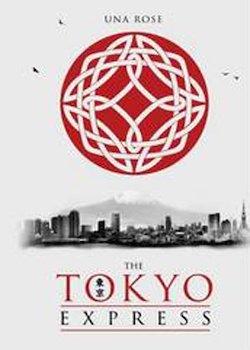The Tokyo Express

By Una Rose
Estuary Publishing, 2013
ISBN-13: 978-0957063525
Review by Harry Martin
The Tokyo Express is the self-published debut novel of Anglo-Irish writer Una Rose. Taking inspiration from her time in Japan and her Irish heritage, Una has encased her story within these distant and distinct cultures, focusing on two international relationships in two very different periods of history. She explores how the cultural differences and similarities between these island nations can affect those committed to this ever-increasing scenario in our multinational society.
In the present day, protagonist Conner is a troubled and acrimonious 20-something Irishman living and working in Tokyo with his Japanese wife Mimi. Following the news of his father’s passing, Conner is bound for an unplanned and unwanted return to his native Ireland, encumbered with the burden of taking up the family business and agonising about the possible treatment his wife might receive in small-town rural Ireland.
Following their return, Mimi is initially enthralled by the bucolic charms and quaint furnishings of Conner’s hometown, but is soon challenged by the introduction of Conner’s overbearing and colourful family, commandeered by his formidable mother who immediately shows lack of interest in and disapproval of the Japanese culture from which Mimi has come. From here the story takes us through alternately humorous and painful accounts of Mimi’s gradual, laboured integration into Conner’s family, confronted with a montage of cultural and linguistic barriers which cause clashes and pressure in their marriage.
Mimi’s initial isolation is alleviated by the introduction of Conner’s grandfather Owen, who spent a highly significant part of his life in Japan following World War II. This, in the form of his well-kept and extensive wartime diaries, introduces the secondary story line to the novel, which follows his experience of war-torn Tokyo and the love he found in the carnage there.
Una’s depiction of post-war Tokyo is recreated with honest brutality as she evokes a sympathetic but candid portrayal of the starvation, death and destruction that affected much of the populace in greater Tokyo and wider Japan at the time. She manages to capture the exhaustion that the post-war generation felt, and their movement away from the traditions of imperial Japan towards the more modern society we see today. Owen was there to experience all this first hand, guided by his lover Mariko who, as a modern-day feminist, was paving the way for women’s rights in the emerging Japan of the modern age.
The context of destruction and rebuilding around Mariko’s and Owen’s wartime relationship is immediately drawn into parallel with Conner and Mimi’s story following the devastating effects of the 2011 Tohoku earthquake and tsunami – with Mimi’s hometown decimated, Conner is forced to relive the apocalypse to which his grandfather was exposed sixty years earlier.
Una has woven the bilinear storylines with expert artistry; navigating this often challenging task with precision, she has allowed both Conner’s and Owen’s stories to flow in a harmonious parallel whilst complementing but not distracting from each other. Both stories carry weight and relevance in their own right but the way in which Una has brought them together in this familial saga creates an ambitious and profound work, resulting in a more lasting impression than either story on its own.
Despite the very specific Japanese-Irish confines of this particular love story, the theme is universal as the challenges, discomforts and complications experienced by both Conner and Mimi and Owen and Mariko are those to which many readers will be able to relate. Una has shone a spotlight on the struggles that can occur when trying to forge cross-cultural relationships against the sometimes resistant current of cultural norms and national identity. This is a pertinent contemporary subject for our modern age and one that is likely to be appreciated by a wide and varied audience.

